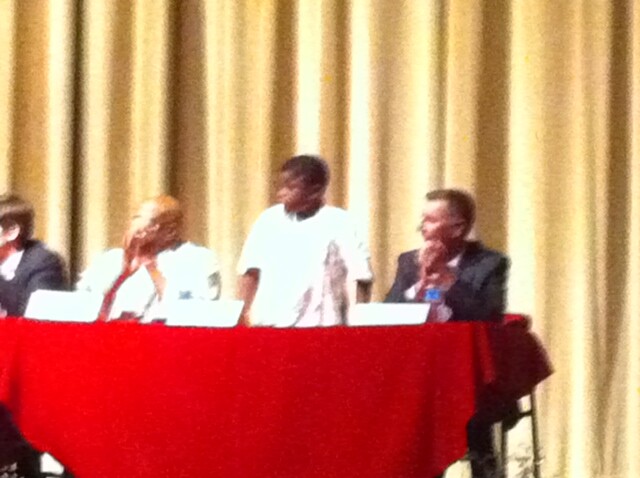Getting Schooled on the Crisis in Black

The intro for last night's event focusing on the imperiled state of black males in public education was both appropriate and terribly ironic: strains of upbeat, sophisticated jazz that filled the high-ceilinged auditorium at Santee Educational Complex as the crowd mingled and found its seats. The music reminded everyone of the heights of black achievement--it was the kind of jazz featured at concerts, awards banquets and other celebratory affairs--yet it was the barriers to black achievement that we had gathered to discuss tonight. Call it an aspirational sound track.
Hosted by Mayor Villaraigosa's reform-minded Partnership for Los Angeles Schools, the event was a screening of a documentary about the state of black males, "Beyond the Bricks," followed by a panel discussion that included local notables like L.A. Urban League president Blair Taylor, LAUSD superintendent John Deasy and actor/activist Lou Gossett Jr. (disclosure: my dad, Larry Aubry, a veteran education activist, was also on the panel). Perhaps the most interesting participant was Kevin Mitchell, a seventh-grader at Markham Middle School in Watts. A prepubescent kid up on stage seated at the table amongst the adults and especially next to Deasy, the big cheese of L.A. schools, provided a visual that was well worth the trip. Cecil Murray, pastor emeritus of First A.M.E. church, was the panel moderator who couldn't help being a preacher at points.
The 45-minute film efficiently and disturbingly laid out what everybody there already knew, that black male students consistently rank at the bottom of everything associated with achievement (test scores, graduation rates) and at the top of everything associated with failure (dropout rates, suspension rates, employment). The movie focused on Newark, a big city that's kind of a ground zero for this troubling trend, but no American city is exempt. L.A.'s stats on black male students are actually better than most, but that's hardly cause for celebration--forty percent graduating high school annually versus thirty percent in New York, the city with the greatest number of black students in public schools. The problem is epidemic.
It was hard to be cheered by any of the data or analyses, which wasn't the point of the evening. We were not there to be entertained, but informed and shocked into outrage and group action--"We need to be storming the castle!" as Taylor repeatedly said. But it was clear that the scope of the crisis and the Herculean, often Sisyphean task of trying to make things better--trying to make all those ugly statistics move in the right direction for the sake of the black boys, and for the sake of us all--tied the audience up in knots. On the one hand, it wanted the depth of the problem acknowledged and addressed; on the other hand, it worried about how that problem pathologized blacks as a whole. Put another way, we all saw ourselves in the image of the least fortunate among us, and we didn't like it. One woman, a grandmother of five boys who all did well in school, decried the lack of "positive" images of black males. Another woman impatiently said that we already knew about the bad news, had lived it--so what could we all do, starting tomorrow?
There were no easy answers, of course, just more trenchant observations. Marqueece Harris-Dawson, president of the Community Coalition, said that the real problem goes much deeper than the data. The real problem is that black males are too quickly perceived by school staff and by the rest of the world--including other blacks--as bad actors, when in fact they're often just expressing defiance common to all adolescents. Deasy proposed that LAUSD, by suspending so many black males so often for relatively minor infractions, is exacerbating the dropout problem, not correcting it. Kevin Mitchell sounded the most hopeful note of the night when he described how his friend at Markham had started a kind of support group for boys who seemed depressed. After an exhausting evening, that admission of humanity in black males by a very young but astute black male was, dare I say, feel-good.


